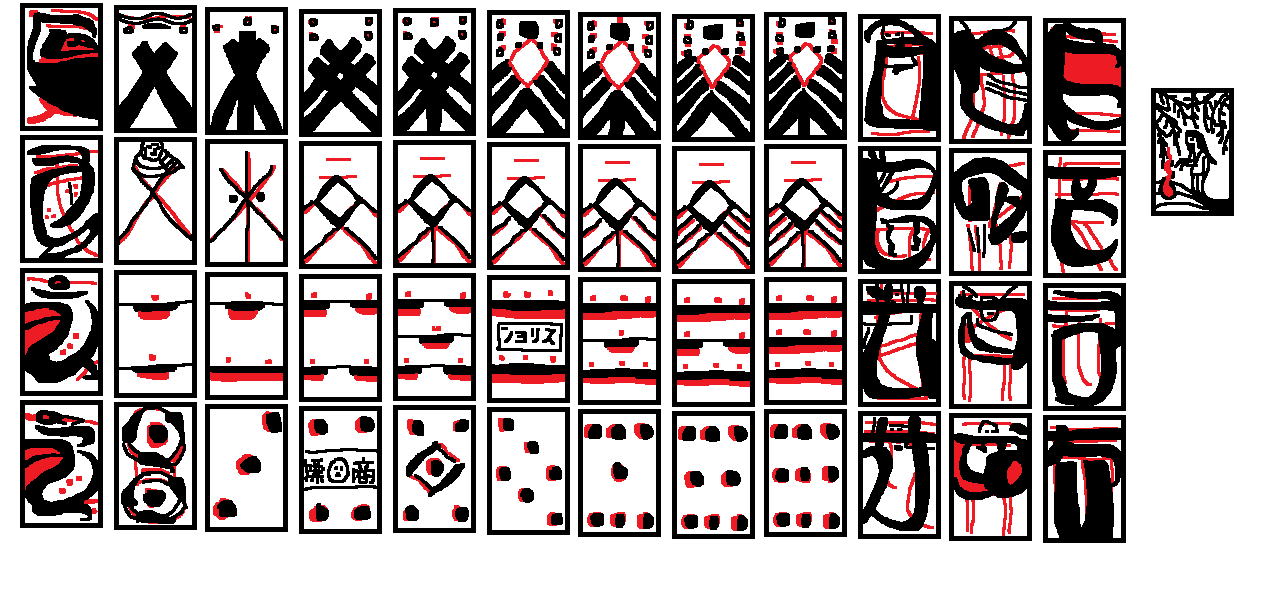Yomi (読み - よみ, lit. “Reading”) is a type of sequence game that was popular in Japan during the Edo period.
It is the ancestor of hanafuda games such as Poka and Hiyoko, and shares the same gameplay mechanics.
Originally, it was played using Tensho Karuta, which were faithful copies of the Portuguese playing cards. It was also thought to be played using local mekurifuda patterns with abstract designs based on Tensho Karuta, hence giving them the term “Yomi Karuta” or “Yomifuda”.
There were many different variants of this game, but very few have survived. The last known surviving Yomi game is Kakkuri, which is played in the town of Yafune, part of the city of Echizen, Fukui prefecture in Japan.
The game described below is a simple Yomi game for 3 to 4 people. However, the scoring and Yaku rules have not been attested.
(NEEDS MORE DOCUMENTATION)
¶ The Cards
A Tensho Karuta or Mekurifuda deck is used.

For 4 players, use 40 cards by removing all Horses and Kings from the deck.
You may also add in an extra card (preferably the Onifuda (“demon” joker card) or the Shirofuda (blank card) to be used as a wild card.
For 3 players, use 30 cards by further removing all cards of the Sword suit in the deck.
You may also add in the 2 of Swords as a wild card.
If you do not have a Tensho/Mekuri Karuta deck, you may use western playing cards by removing all courts (and all cards of the Spade suit, if playing with only 3 players), and using the Joker as the wild card.
You may also use hanafuda, but you must be familiar with the month sequence before playing the game.
¶ Game Setup
¶ Choosing the Dealer
There is no attested method for choosing a dealer, so you may use whichever method suits you.
¶ Dealing the Initial Cards
Dealer shuffles and deals 10 cards are to each player. If a wild card is included, there will be one card left; place it on the table face down. It will not be used for this round.
¶ Forming the Discard Pile
Dealer places any one card from his/her hand onto the table face-up. This will serve as the discard pile.
¶ Gameplay
Dealer plays first; turns move counter-clockwise.
During a player’s turn, he/she looks at the topmost card in the discard pile, and then looks for a card of the next number from his/her hand.
The number sequence is on a loop; if a 10 (Maid) is the top card on the discard pile, you must discard a 1 (Dragon).
If the player has a card of the next number, he/she discards it onto the discard pile face-up. That player gets another turn.
If the player doesn’t have one, he/she passes the turn to the next player.
¶ Wild Card
The wild card can be used to follow any card, or be followed by any card, regardless of its number.
¶ Winning the Round
During each round, the goal is to discard all the cards in your hand before other players can do the same. If you do, the round ends and you win the round, and you become the dealer for the next round.
¶ Variation
There is another ruleset for a game called “Yomi” which is different from what was explained above.
This game is played by 4 players.
¶ The Cards
Only 37 out of 48 cards from a mekurifuda deck is used; remove all cards of the Swords suit except for the 2 of Swords. (The Onifuda is also not used.)
¶ Dealing the Initial Cards
Dealer shuffles and deals 9 cards are to each player. Place the undealt card on the table face down; It will not be used during gameplay, but it will be added to the score of the winner of the round.
¶ Checking for Teyaku
Each player must check their hands for any Teyaku before the dealer starts their first turn. If they have, they will earn Teyaku points if they win the round.
A complete list of Teyaku was not attested, but Sanko/Danjuro (1, 2, and 10 of Clubs) is used.
¶ Forming the Discard Pile
Dealer places any one card from his/her hand onto the table face-up. This will serve as the discard pile.
¶ Gameplay
Dealer plays first; turns move counter-clockwise.
During a player’s turn, he/she looks at the topmost card in the discard pile, and then looks for a card of the next number from his/her hand.
The number sequence is on a loop; if a 12 (King) is the top card on the discard pile, you must discard a 1 (Dragon).
If the player has a card of the next number, he/she discards it onto the discard pile face-up. That player gets another turn.
If the player doesn’t have one, he/she passes the turn to the next player.
¶ Winning the Round
During each round, the goal is to discard all the cards in your hand before other players can do the same. If you do, the round ends and you win the round, and you become the dealer for the next round.
¶ Score Calculation
The winner earns points from all discarded cards, plus their Yaku points if they have one.
Card points and Yaku points have not been attested.